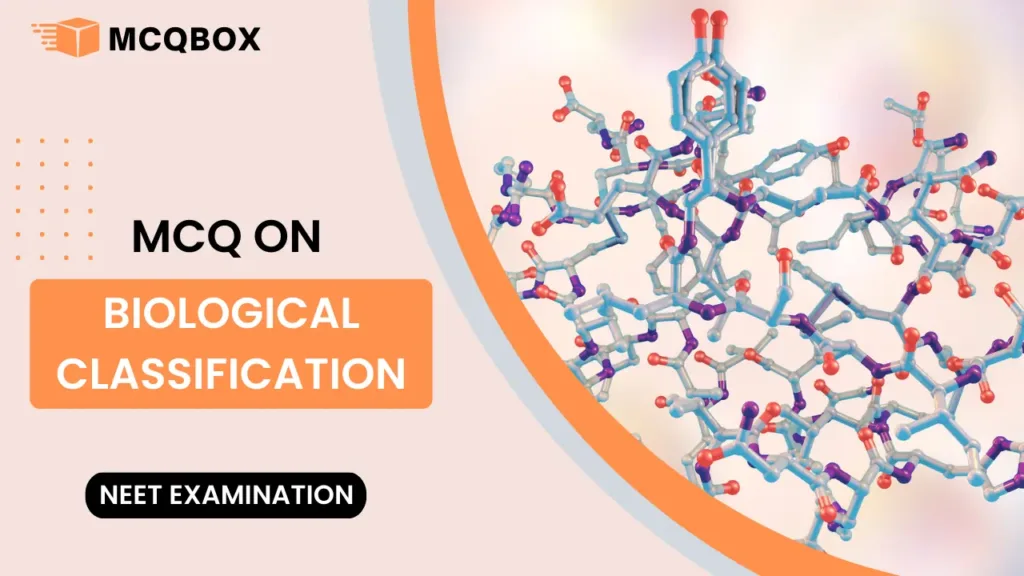Gear up for NEET Exam 2024 with these challenging MCQ on Biological Classification for NEET Exam. Test your knowledge and ace the exam!

MCQ on Biological Classification for NEET Exam
1. Who proposed the Two Kingdom system of classification dividing organisms into Plantae and Animalia?
a) Aristotle
b) R.H. Whittaker
c) Linnaeus
d) Dmitri Ivanowsky
Answer: c) Linnaeus
2. What is the primary characteristic used by R.H. Whittaker to classify organisms in the Five Kingdom system?
a) Presence of red blood
b) Mode of reproduction
c) Cellular structure, complexity, and mode of nutrition
d) Geographical distribution
Answer: c) Cellular structure, complexity, and mode of nutrition
3. Which of the following is NOT a kingdom in Whittaker’s Five Kingdom Classification?
a) Monera
b) Protista
c) Eukarya
d) Fungi
Answer: c) Eukarya
4. Which kingdom includes organisms with prokaryotic cells?
a) Plantae
b) Animalia
c) Protista
d) Monera
Answer: d) Monera
5. Which kingdom includes organisms like fungi, characterized by chitin in their cell walls?
a) Plantae
b) Animalia
c) Protista
d) Fungi
Answer: d) Fungi
6. Which group of organisms are characterized by having a rigid cell wall made up of cellulose?
a) Protista
b) Fungi
c) Plantae
d) Monera
Answer: c) Plantae
7. Which of the following organisms is NOT included in the Kingdom Animalia?
a) Amoeba
b) Housefly
c) Mushroom
d) Dog
Answer: c) Mushroom
8. Which of the following is NOT a method of asexual reproduction in fungi?
a) Fragmentation
b) Budding
c) Conjugation
d) Fission
Answer: c) Conjugation
9. What is the primary characteristic of viruses?
a) Acellular nature
b) Presence of a protein coat
c) Ability to perform photosynthesis
d) Presence of a rigid cell wall
Answer: a) Acellular nature
10. What is the primary mode of nutrition in lichens?
a) Heterotrophic
b) Autotrophic
c) Parasitic
d) Saprophytic
Answer: b) Autotrophic
11. Which scientist proposed the Five Kingdom system of classification?
a) Charles Darwin
b) Robert Hooke
c) R.H. Whittaker
d) Gregor Mendel
Answer: c) R.H. Whittaker
12. Which kingdom includes organisms such as algae, mosses, and ferns?
a) Protista
b) Plantae
c) Fungi
d) Animalia
Answer: b) Plantae
13. Which kingdom includes organisms such as amoebas, paramecia, and slime molds?
a) Protista
b) Monera
c) Animalia
d) Fungi
Answer: a) Protista
14. What is the primary mode of nutrition in Monera?
a) Photosynthesis
b) Absorption
c) Holozoic
d) Chemiosynthesis
Answer: b) Absorption
15. Which of the following is NOT a characteristic of fungi?
a) Presence of chitin in cell walls
b) Heterotrophic mode of nutrition
c) Unicellular structure
d) Reproduction by spores
Answer: c) Unicellular structure
16. What is the primary mode of reproduction in Protista?
a) Fragmentation
b) Binary fission
c) Spore formation
d) Budding
Answer: c) Spore formation
17. Which of the following is a characteristic feature of dinoflagellates?
a) Presence of pseudopodia
b) Cellulose plates in cell walls
c) Bioluminescence
d) Photosynthetic flagellated structure
Answer: c) Bioluminescence
18. Which group of organisms is characterized by aggregation forming plasmodium?
a) Protozoans
b) Euglenoids
c) Slime moulds
d) Chrysophytes
Answer: c) Slime moulds
19. What is the primary mode of reproduction in fungi?
a) Binary fission
b) Fragmentation
c) Spore formation
d) Budding
Answer: c) Spore formation
20. Which of the following is an example of a symbiotic association in fungi?
a) Mycorrhiza
b) Conidia
c) Oospores
d) Ascospores
Answer: a) Mycorrhiza
21. Which of the following is NOT a characteristic of viruses?
a) Acellular nature
b) Presence of both DNA and RNA
c) Ability to reproduce independently
d) Dependence on host cells for replication
Answer: c) Ability to reproduce independently
22. Which kingdom includes organisms such as mushrooms, yeasts, and molds?
a) Plantae
b) Animalia
c) Fungi
d) Protista
Answer: c) Fungi
23. What is the primary role of chrysophytes in their ecosystems?
a) Decomposition
b) Parasitism
c) Photosynthesis
d) Bioluminescence
Answer: c) Photosynthesis
24. Which of the following is a characteristic feature of Amoeboid protozoans?
a) Presence of flagella
b) Formation of spores
c) Movement using pseudopodia
d) Photosynthetic mode of nutrition
Answer: c) Movement using pseudopodia
25. What is the primary function of pellicle in Euglenoids?
a) Protection against predators
b) Photosynthesis
c) Facilitation of movement
d) Absorption of nutrients
Answer: c) Facilitation of movement